'It makes me feel like I’m in a family here': Women's refugee group creates connections

DENVER — Syria, Afghanistan, Democratic Republic of Congo, Lebanon … all countries represented in a small circle of about 30 women on a quiet November morning.
“Let’s take two minutes to meditate,” said Mireille Bakhos, the leader of this women’s group.
So they sat in silence with eyes closed for a couple of minutes before they started the day’s main activity: riding bikes around Central Park in Denver. Both of these things meant to be tools for these women as they make a home in their new country.
Bakhos works for the International Rescue Committee in Denver. It is a nonprofit that supports refugees, asylum seekers, and Special Immigration Visa (SIV) holders. It helps resettle people who are fleeing their home countries due to war, disasters or persecution.
“We always try to be very responsive to what the clients need, right? If people need something and like, we cannot assume what people need and just give them what we think they need. So we noticed a lot of isolation. We noticed that when we're doing any kind of program women, they want to talk,” explained Bakhos. “Women want to meet, and then they want to talk, and then want to have fun.”
In 2018 Bakhos started this group called “We Can Do It!” The program has served 55 women from 12 different countries and aims to create a safe environment for women to connect with others, rebuild communities they lost with displacement, and give them tools and mediums to process their traumas.
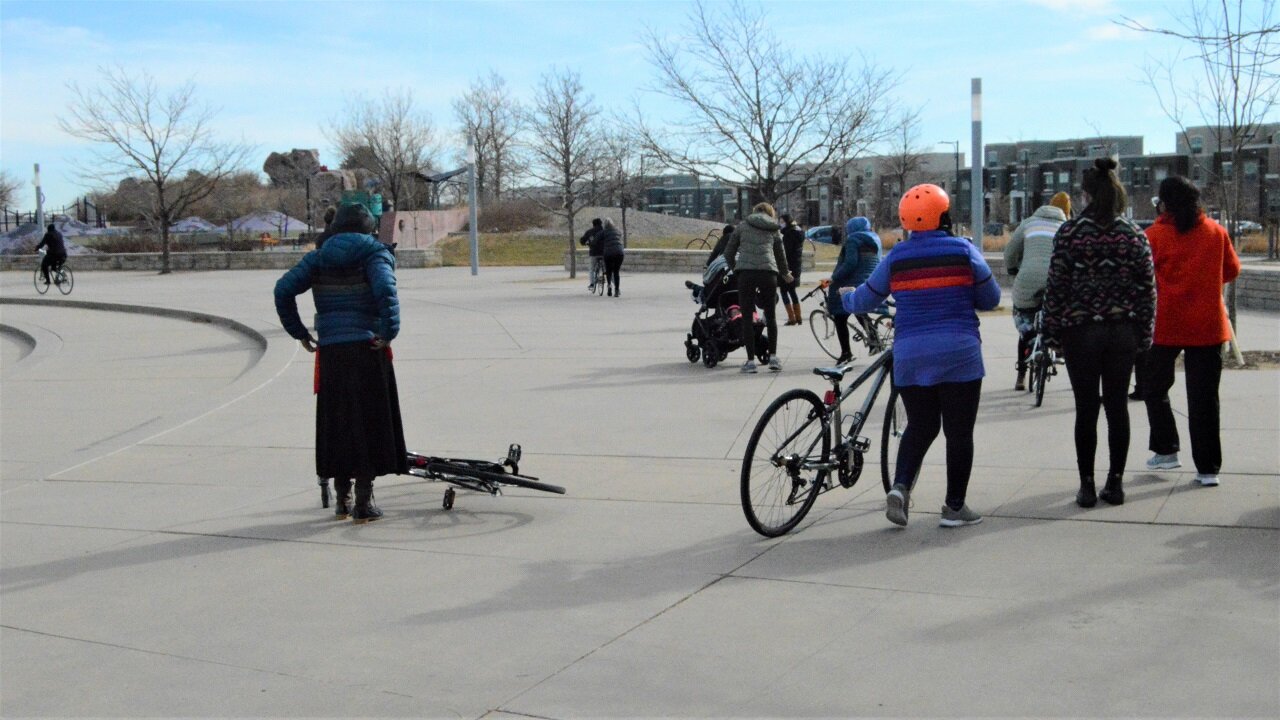
“Because often we feel, like, very lonely and very heavy with our story. And we don't know what other people would think if we share it,” said Bakhos. “But then when we start hearing other people talking about their stories, we feel like, ‘Oh, I'm not alone in this, and I can share my story and put it out there for the group and for the world to, you know, carry it with me.”
This program runs once a year for about five or six months, meeting for three hours, once a week. Each year the program has looked different. During the first year, the group learned different artistic skills like candle making, painting and pottery. The second year, they did more expressive art like photography, theater, dancing and singing. Last year was a little complicated with the pandemic, and this year is all about the outdoors: hiking, biking, snowshoeing and ice skating are all in the plan.
“We wanted to give the women this opportunity to also discover this side of Colorado, but also because wilderness is huge with the impact it has on people and their wellbeing,” said Bakhos.
That is the main thing each year’s program has in common: to give women the ability and space to work on their mental and emotional health.
“We use those tools to give people mediums and ways to, like, relax, be creative, be mindful, connect with other people, forget about all the stress that's happening outside,” Bakhos explained. “And we try to help them add to their toolbox of wellbeing.”
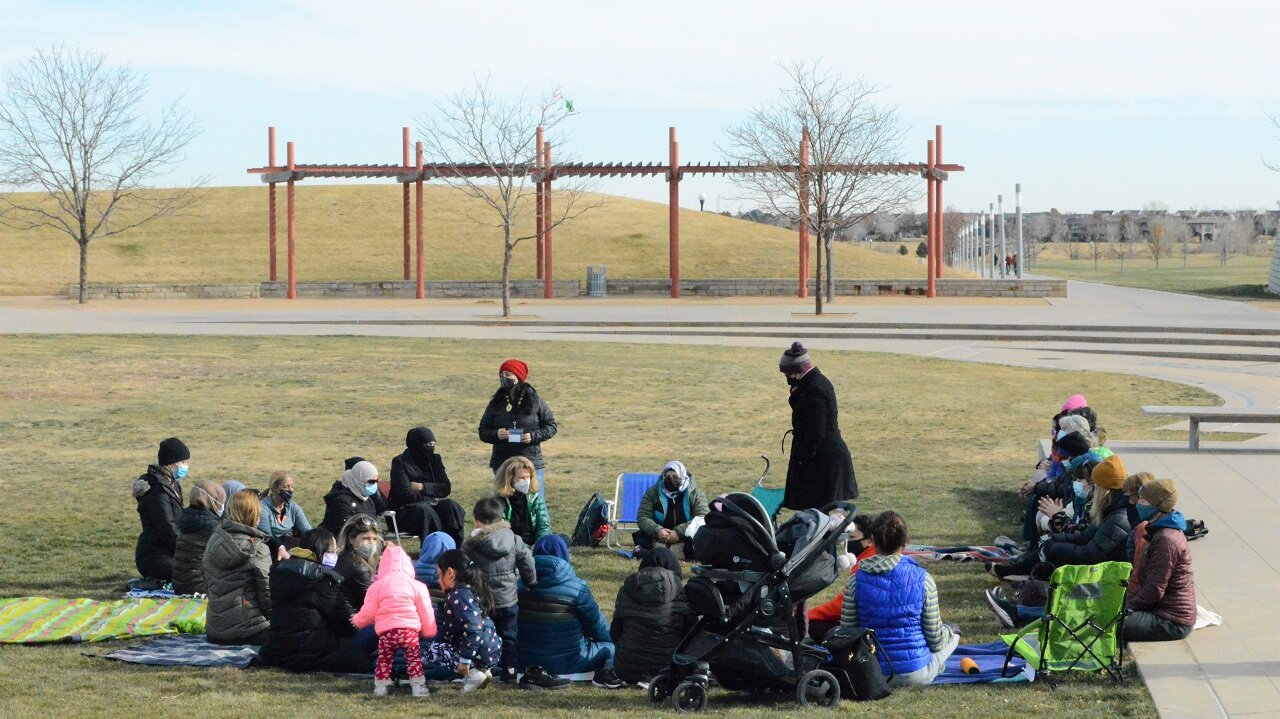
With every meeting there is a moment of meditation and a number of volunteers and interpreters help translate the introductions of the meeting. Not wanting language to be a barrier, Bakhos made sure this group felt welcoming and inclusive.
“So we created this women's group where we all come from different backgrounds and have different stories, but we feel safe to share their stories, our stories, to feel less lonely in them,” said Bakhos.
She knows first-hand the difficulties of moving your entire life to a new country. Originally from Lebanon, she left in 2004 for Dubai in the United Arab Emirates. Then she moved to Colorado in 2010 where her family was already settled. While she’s not a refugee, Bakhos understands some of the cycle of emotions.
“Like you're walking and, like, maybe a small smell or like a sound or a song, or a face will bring you back to your homeland and brings all those emotions in you,” Bakhos described.
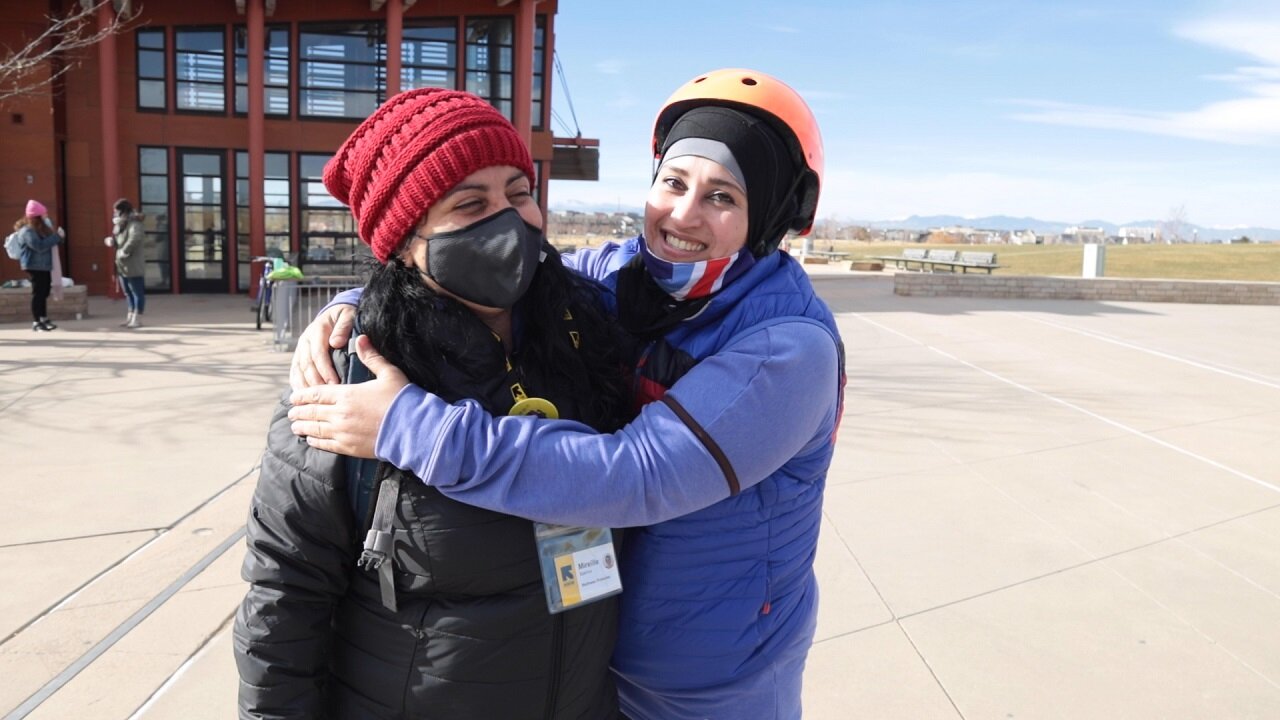
Having these experiences and connections in the We Can Do It! program can help each of these women deal with those emotions. Plus for some women at this meeting, just riding a bike can be a freeing and empowering experience. For example, Afghan women may not have ever ridden a bike or been allowed to as an adult. Once a woman comes of age, they’re not allowed to ride bikes in that country. During the meeting on Thursday, November 18, some women asked their friends in the group to take a picture or video of them riding to send to their families since it was such a significant moment.
“The women are taking their bikes home, which is great because we're hoping that the bikes will bring joy, of course, but also independency. So you don't wait, you know, for someone to take you to the grocery store, you just can bike there,” said Bakhos. “And then you bike, you have all those good hormones, you feel good in your body and your mind.”
That independence part is key. As many women have come from countries where traditionally men go out to work and women take care of the home, many are isolated when they first arrive in the United States.
“Isolation can lead to a lot of mental health challenges,” said Bakhos. “If you're isolated and not growing, you just stay where you are. And such new experiences always help women feel that they're growing, they're learning new skills, and it's very empowering to be in this zone of trying and discovering.”
That’s a big reason why this is a women-only group. It is a space where they can learn more English, learn their rights to an interpreter, and discover ways they can become more proactive in their lives here.
As Bakhos puts it: “Women have more challenges. Displaced women have another added layer of challenge.”
We Can Do It! also focuses on women because many feel more comfortable around other women, and volunteers can act as temporary babysitters as the women focus on bike-riding or just sharing stories.
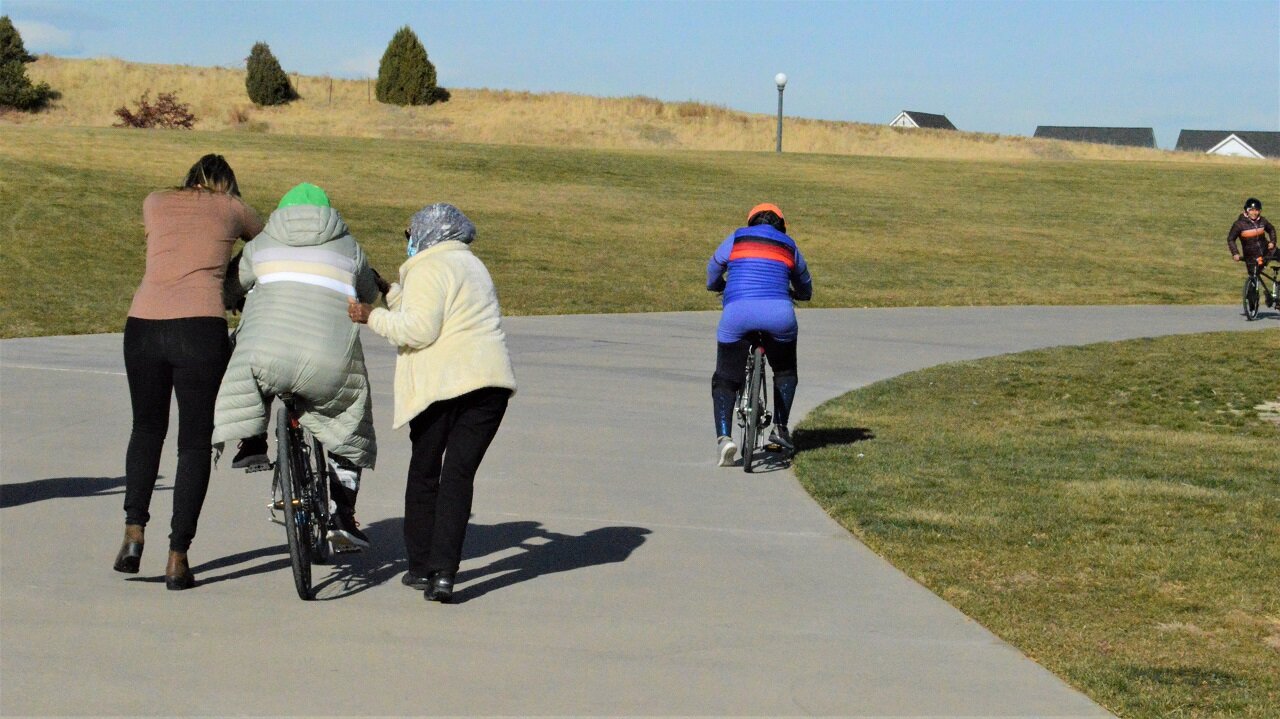
“Working with women from Afghanistan and Syria and Iraq and Congo and Belarus and all those countries, when you sit and listen and you just, like, open your heart and your mind, you feel like how a lot is common between women in the world and how empowering and how beautiful,” said Bakhos. “And [what] it is to like to help another woman and to also receive help from another woman and create this female energy.”
That seems to be the highlight for the participants in the program as well — hearing stories from around the world that still connects them.
“I can talk with the...another woman is not from Syria is Afghanistan woman. I can listen in different language. I like it. I like to [hear] story from woman,” said Saba, a woman originally from Syria and active member of the group.
“I like this program, it makes me feel like I’m in a family here and it helps us to learn something we didn’t know before,” Fatuma told Rocky Mountain PBS through an interpreter.
“I like the program. It’s good. We’re all women and we are doing different things and we are learning things from each other, that’s what I like about it." Dina also told Rocky Mountain PBS through an interpreter. Both Dina and Fatuma are from the Democratic Republic of Congo.
All three women got on the bikes on Thursday to try their hand at riding. Many felt like they had a long way to go, but the smiles on their faces were undeniable.
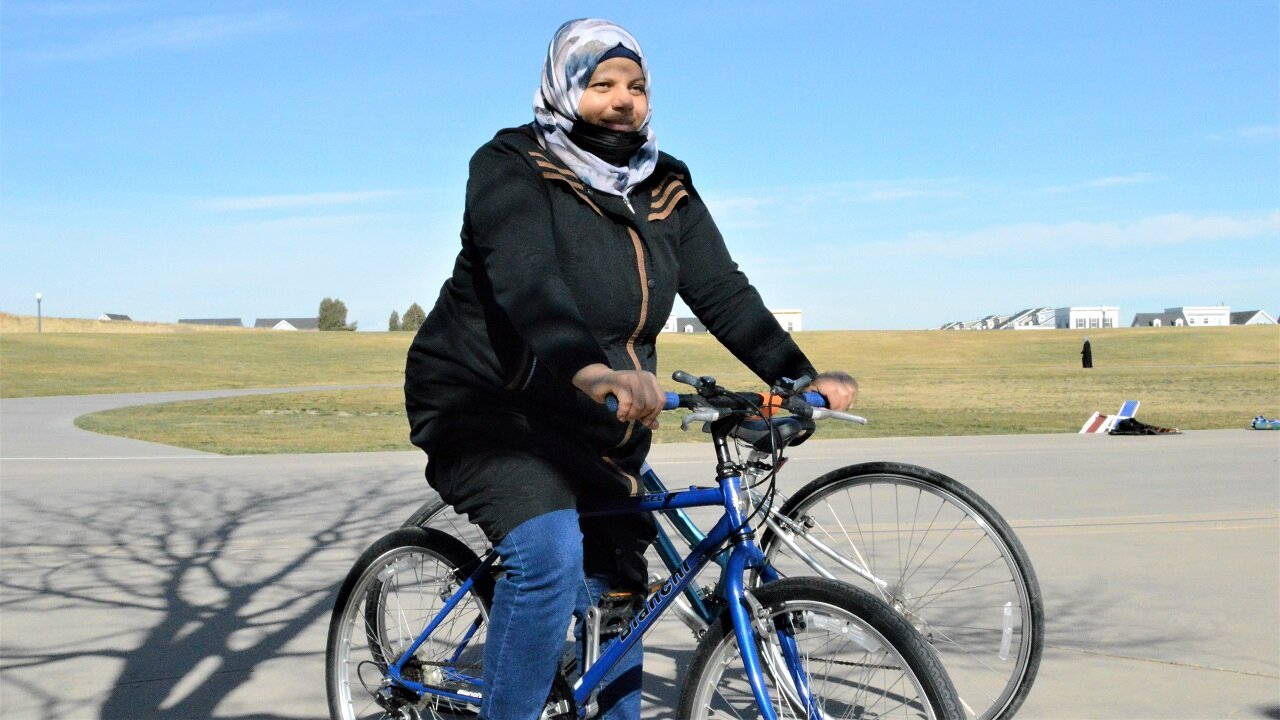
Bikes Together, a group that aims to give everyone the option of bicycling as transportation, donated the bikes for these women. Volunteers helped them get fitted for the right bike and others taught them to ride. Bakhos said she is so grateful for the community partners that make this program possible.
“So I think this collaboration that we're having in the program with other community partners are helping us and helping them and opening doors to more and more to build a bigger inclusive community in where we're living in the city,” said Bakhos.
After the bike-riding on that particular Thursday, the group held a special Thanksgiving feast ahead of the holiday. It included a variety of food from all over the world, and the descriptions of the food were written out in several languages for all to understand.
“We believe that the more inclusive we are, the richer we are in our experiences. And then we can always learn from each other,” said Bakhos. “It's not always like, ‘Oh, let me teach you how to do this... it's like, you tell me to tell me what you do back home because I'm curious to know and to learn as well.”
Related Stories
Once the program wraps up, they have one final event to celebrate the women’s success. One year involved selling their craftwork, another included a showing documentary of the women, and this year’s finale is still in planning but will be something in the spring and recognizing their strength.
“The story is not full unless we say, and we share how strong, how resilient, how creative our, how whole, those refugees that .... we're welcoming to the U.S. are because they're carrying a lot of wisdom. They're carrying a lot of experiences and because of what they went through, they're more resilient,” explained Bakhos.
It is no surprise that Bakhos titled her group with an exclamation point at the end. Her passion and energy fills you up, no matter which of the three languages she knows she’s speaking to you in. And she said her passion comes from the women around her in this group.
“Just the fact of seeing people showing up every week for five and six months, year after year, it shows that it is important for them, that it is adding to their life. And that it's only, you know, it's three hours every week, but those three hours might give them energy and joy for the rest of the week," said Bakhos. “The program brings me so much joy and...so much meaning to my life.”
Amanda Horvath is a multimedia producer with Rocky Mountain PBS. You can email her at amandahorvath@rmpbs.org.
Alexis Kikoen is a multimedia journalist at Rocky Mountain PBS. You can reach her at alexiskikoen@rmpbs.org.